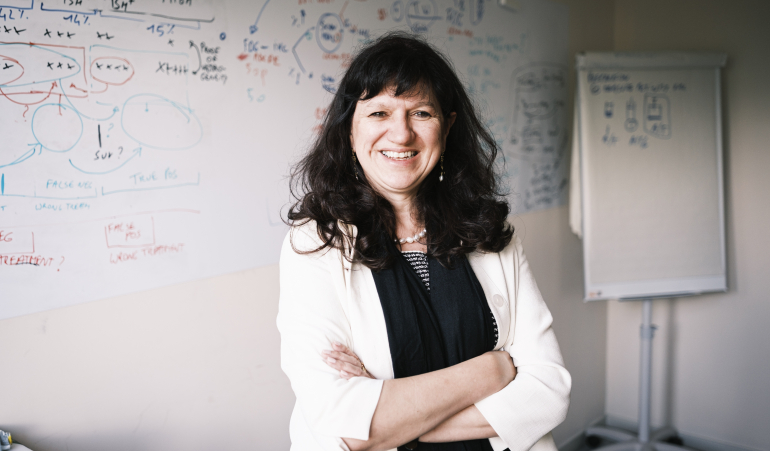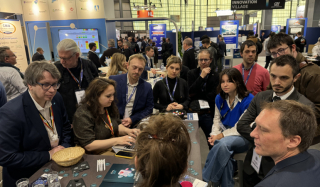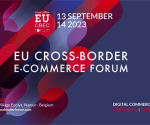
ABSCINT is a clinical-stage company specializing in the development of in vivo imaging diagnostics. While the VUB spin-off already collaborates internationally, ABSCINT is keen to develop its collaborations in North America. That's why the company took part in the “nuclear medicine” mission organized by AWEX. Interview with Karine Clauwaert, CEO of ABSCINT.
Wallonia.be: Could you introduce your company ABSCINT?
Karine Clauwaert (KC): ABSCINT is a clinical-stage company specializing in the development of in vivo imaging diagnostics, in particular tracers for positron emission tomography (PET). Founded in 2020, ABSCINT is a spin-off from the Vrije Universiteit Brussel (VUB).
Wallonia.be: What is ABSCINT's mission?
KC: ABSCINT's mission is to revolutionize care for HER2 cancer patients by developing cutting-edge in vivo imaging diagnostics. The company is committed to using the collective expertise of its dynamic team and employing innovative science to accelerate the journey from diagnosis to personalized treatment.
Wallonia.be: What solutions does Abscint develop?
KC: ABSCINT develops in vivo imaging diagnostics, including radiopharmaceutical PET tracers. The company's technology is based on the use of sdAbs, which, once labelled with a short half-life radioisotope such as gallium-68, are administered intravenously. These sdAbs bind specifically to target proteins on abnormal cells, enabling precise visualization via PET scans. This approach offers full-body imaging within 60 to 90 minutes of injection, without the need for hospitalization, thanks to rapid clearance and a low radiation dose.
Wallonia.be: What results have you already achieved?
KC: ABSCINT has demonstrated the effectiveness of its technology in several clinical studies. For example, in the case of Isabella, a 67-year-old patient with metastatic breast cancer initially diagnosed as HER2-negative, the use of the ABSCINT-HER2 PET/CT tracer enabled the detection of additional bone metastases not identified by traditional methods. This accurate detection led to a reclassification of her HER2 status and an adaptation of her treatment plan. Of course, this change of treatment was also confirmed by other technologies, as ABSCINT's product is still in clinical development. This combined approach ensures informed decision-making and underlines the potential of our technology to improve patient stratification and optimize targeted treatments.
Wallonia.be: What sets you apart from other companies in your sector?
KC: What sets ABSCINT apart from other companies in the sector is its innovative use of sdAbs to develop PET tracers. sdAbs offer high specificity, rapid clearance and low immunogenicity, making them ideal for in vivo imaging. What's more, ABSCINT's technology enables full-body imaging in less time, improving patient comfort and safety.
ABSCINT is also distinguished by its exclusive focus on diagnostics. Most nuclear medicine companies develop diagnostic and treatment pairs, whereas ABSCINT opts for a purely diagnostic strategy. Indeed, the reference diagnostic product for HER2 can also be used as a diagnostic companion for ADCs, monoclonal antibodies (mAbs) and small molecules. By not developing a therapeutic product of its own, ABSCINT retains the possibility of collaborating with all HER2 product developers, without entering into direct competition with their therapeutic offerings.
Wallonia.be: What is ABSCINT's international track record?
KC: ABSCINT is a Belgian company headquartered in Liège. Its product is currently in clinical development in Belgium, with trials underway in several specialized centers, including Institut Jules Bordet (Anderlecht), Onze-Lieve-Vrouwziekenhuis (Aalst), Chirec (Brussels), UZ Brussel (Jette) and Cliniques Universitaires Saint-Luc (Sint-Lambrechts-Woluwe). Another center, UZ Leuven (Leuven), is due to join the trials shortly.
However, the use of our technology is not limited to Belgium. Our product is already being used internationally in Investigator-Initiated Trials (IITs). We collaborate with centers in the UK, Austria, Australia and France, and are actively seeking to expand these collaborations. Our ambition is clear: we want to establish partnerships in North America to further develop and evaluate our solution on a global scale.
Wallonia.be: Why are you taking part in the “nuclear medicine” mission organized by the Walloon Export and Foreign Investment Agency to the USA and Canada?
KC: By participating in this mission, ABSCINT hopes to establish relationships with key players in the nuclear medicine sector in the USA and Canada, identify collaborative research opportunities and assess the potential of its solutions in these markets. The company also aims to understand local regulatory requirements to facilitate future introduction of its products in North America.
Wallonia.be: What are your expectations of the USA and Canada?
KC: The USA and Canada are important markets for nuclear medicine and healthcare innovation. ABSCINT is particularly interested in these countries because of their advanced medical infrastructure, commitment to the adoption of cutting-edge technologies and opportunities for collaboration with world-renowned research institutions. Entering these markets would enable ABSCINT to contribute to improved diagnostics and treatments for HER2 cancer patients in North America.
Interviewed by Isabelle Anneet (AWEX)






